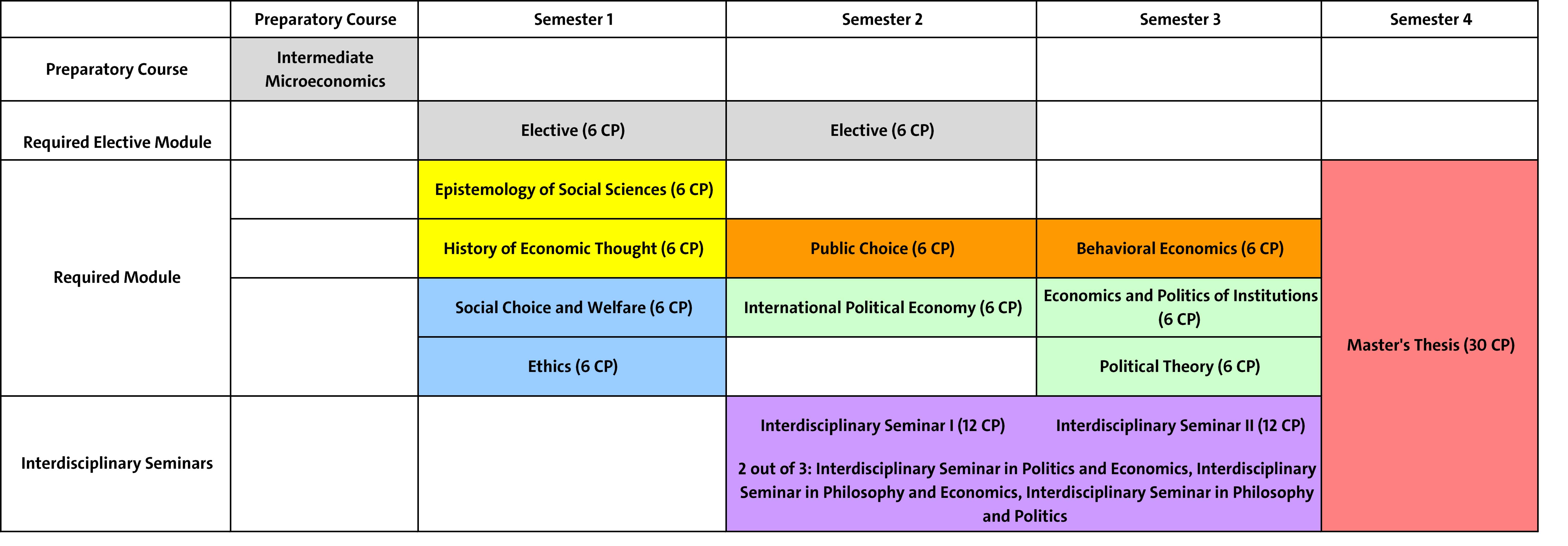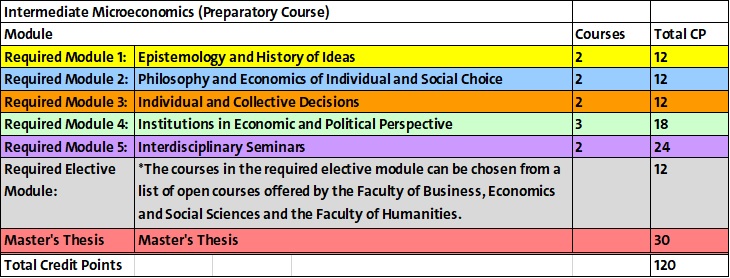Program start until winter semester 2025/26
The PEP curriculum has been revised. The new curriculum will take effect in the winter semester 2026/27. Since there are implications for students in higher semesters, please read the following information carefully.
- Students who started the program in the winter semester 2025/26 or earlier can finalize their studies under the old curriculum until the summer semester 2027. Please check the information about the course offers for the transition period which will be updated regularly.
- Students who decide to finalize their studies under the new curriculum can transfer to the new subject specific provisions. Please contact the Academic Office if you are interested in transferring and check the information about the transfer.
- Students who started the program in the winter semester 2025/26 or earlier and do not finalise the required courses for PEP (including Electives) by the end of the summer semester 2027, will be transferred to the new subject-specific provisions with the start of the winter semester 2027/28.
Curriculum (program start until 2025/26)


The PEP curriculum consists of a non-compulsory preparatory course, five required modules, a required elective module and the master’s thesis.
Preparatory Course Intermediate Microeconomics
The non-compulsory preparatory course Intermediate Microeconomics introduces students to the foundations of microeconomics and is indispensable for understanding the compulsory economics courses in your master’s program. It is particularly recommended to those students who do not have a bachelor’s degree in economics. The course takes place as a block course before the start of the regular courses in the first semester.
Required Module 1: Epistemology and History of Ideas
This module gives an overview of modern epistemology, the philosophy of science and the history of economic thought. Students learn to deliberate over the methodological background of the disciplines, they acquire knowledge of the history of economic thought and they learn to reflect on debates in current economics drawing on the history of economic thought.
- Epistemology of Social Sciences: This lecture introduces students to issues relating to the construction, functionality, and development of empirical theories. Concepts such as “causality” play a central role. Further thematic focuses are the correlation between the development of theory and the development of concepts, the relationship between theories and models, and the examination of controversies surrounding explanatory and interpretive approaches in the social sciences. These issues will be explained and discussed using both selected classical standpoints within the philosophy of science and current academic debates.
- History of Economic Thoughts: This course discusses the following topics from the viewpoint of the history of economic theory: individual decisions, their macroeconomic effects (on welfare), explicit and implicit coordination mechanisms, the possibility or necessity of sovereign intervention, etc. It compares and analyzes different solutions from various schools of thought. The course explores and reflects critically upon the evolution of economic theory, for example, in the classic tradition of Smith, Mill, and Marx or by using selected political and economic controversies of the nineteenth and twentieth centuries.
Required Module 2: Philosophy and Economics of Individual and Social Choice
This module is devoted to the positive and normative analysis of individual and collective decision-making. Students learn about the fundamental conflict between basic normative criteria in collective decision-making and they become familiar with issues of distributive justice and with ethical theories that are particularly relevant to the study of decision making in politics and economics.
- Social Choice and Welfare: The course deals with the ethical and positive aspects of welfare economics as well as the material implications of collective decision-making and voting procedures. It addresses in greater detail core findings relating to the aggregation of preferences (e.g., the impossibility theorems of Arrow, Sen, and Gibbard-Satterwaite).
- Ethics: This lecture addresses questions in the fields of meta-ethics, normative ethics, and applied ethics. In the area of meta-ethics, the course covers questions relating to the semantics of moral expressions, the examination of cognitive and non-cognitive positions, and their connection to the realism/anti-realism debate. In the realm of normative ethics, the course provides an overview of the most important deontological and teleological positions. In the area of applied ethics, the course addresses issues that are particularly relevant for economists. This includes issues such as distributive justice.
Required Module 3: Individual and Collective Decisions
In this module, students acquire basic knowledge in the descriptive theory of individual and collective decisions. Moreover, they learn how to apply economic methods to analyze behavior of political agents like governments, parties and lobby groups.
- Public Choice: The course introduces the fundamental concepts of classic public choice theory. It deals with the behavioral model and the range of methodological instruments in economics as applied to political agents, institutions, and processes. Political agents such as governments, parties, administrations, or special interest groups are modeled as rational utility maximizing agents. The course also addresses new findings deriving from consideration of boundedly rational behavior and the design and effect of institutions. Public choice includes a range of sub-theories: the theory of preference aggregation, constitutional political economy and the economic theory of democracy, autocracy, special interest groups, and bureaucracy.
- Behavioral Economics: The course addresses fundamental insights of behavioral economics, which are based primarily on laboratory experiments on individual and collective decision-making. Participants discuss deviations from normative decision theory and possible explanations for empirical findings that have led to new descriptive theories such as prospect theory or the theory of social preferences.
Required Module 4: Institutions in Economic and Political Perspective
In this module, students develop the capacity to analyze the effect of institutions on individual and collective decisions against the background of economic and political theory. They learn how to analyze specific national and international organizations and the legal texts and contracts they are subject to. Moreover, students learn how to apply modern political theories to questions of welfare economics and individual and collective decision-making processes and they are trained in deriving and justifying normative positions based upon these theories.
- International Political Economy: The course addresses selected problems of international political economy by looking at specific policy fields. Topics may include: the analysis of trade policy by means of strategic international economic theory, political economy of international migration, political economy of international currency and finance relationships, international treaties for the environment and use of resources. The course analyzes institutions such as GATT (WTO), the IMF, the World Bank, and selected EU institutions.
- Economics and Politics of Institutions: The course addresses the problems of collective decision-making in depth. Central to the course is the strategic action of different agents such as governments, parties, special interest groups, and consumers. It will be demonstrated how market or political outcomes are determined through institutions, i.e., formal or informal rules and regulations, and how they are influenced by their design.
- Political Theory: The course addresses the conceptual and practical problems of modern constitutionalism, modern democracy, as well as approaches in governance and compliance and the conceptualization of fundamental norms such as constitutional rights, citizenship, rule of law and human rights, for the latter also pertaining to international society. The works of Rawls, Dworkin, Sandel, Habermas, Tully, Taylor, Nozick, Sen, Jean Cohen, Slaughter, Kratochwil, and Byers, among others, will be discussed during the course. Particular attention will be given to the conceptional elements of the relationships between agents (and institutions) of the market, the law, culture, and politics (see also the connection to the course Social Choice and Welfare).
Required Module 5: Interdisciplinary Seminars
In the interdisciplinary seminars methods and results from philosophy, economics and politics are applied, consolidated and contrasted in view of specific individual and collective decision-making problems. Students have to choose two out of three interdisciplinary seminars.
- Interdisciplinary Seminar in Politics and Economics: Various themes relating to individual and collective decisions with a focus on integrating the disciplines of political science and economics.
- Interdisciplinary Seminar in Philosophy and Economics: Various themes relating to individual and collective decisions with a focus on integrating the disciplines of philosophy and economics.
- Interdisciplinary Seminar in Philosophy and Politics: Various themes relating to individual and collective decisions with a focus on integrating the disciplines of philosophy and political science.
Required Elective Module
The courses in the required elective module can be chosen from a list of open courses offered by the Faculty of Business, Economics and Social Sciences and the Faculty of Humanities.
Types of instruction: Lecture, seminar or interactive course.
Type of examination: Module component examinations will be held pursuant to §13 (4) of the Examination Regulations. The exact type of examination shall be announced before the beginning of each course.
Total workload of module: The module comprises a total of 12 CP. Two courses with 6 CP are listed in the curriculum.
Courses with fewer or more than 6 CP can also be offered. In this case, the module can be completed with more than two courses.
The philosophy electives are completed with 6 CP and a graded term paper.
For more information on the PEP program please read the Study Guide.
